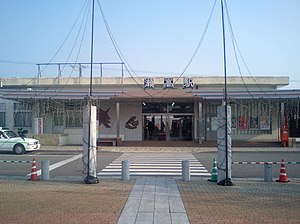Setaka Station
JB 22 Setaka Station 瀬高駅 | |
|---|---|
 Setaka Station in 2006 | |
| Location | Miyama, Fukuoka Japan |
| Coordinates | 33°09′25″N 130°29′07″E / 33.15695°N 130.48514°ECoordinates: 33°09′25″N 130°29′07″E / 33.15695°N 130.48514°E |
| Operated by | |
| Line(s) | ■ Kagoshima Main Line, |
| Distance | 132.2 km from Mojikō |
| Platforms | 1 side + 1 island platforms |
| Tracks | 3 + 1 siding |
| Construction | |
| Structure type | At grade |
| Disabled access | Yes - footbridge to platforms equipped with elevators |
| Other information | |
| Status | Staffed ticket window (Midori no Madoguchi) |
| Website | Official website |
| History | |
| Opened | 1 April 1891 |
| Previous names |
|
| Passengers | |
| FY2016 | 1,230 daily |
| Rank | 138th (among JR Kyushu stations) |
| Location | |
 JB 22 Setaka Station Location within Japan | |
Setaka Station (瀬高駅, Setaka-eki) is a railway station on the Kagoshima Main Line in Miyama, Fukuoka Prefecture, Japan.[1]
Lines[]
The station is served by the Kagoshima Main Line and is located 132.2 km from the starting point of the line at Mojiko.[2] Local and rapid services on the line stop at the station.
Layout[]
The station consists of a side and an island platform serving three tracks. The station building is a modern, flat-roofed concrete structure which houses a ticket window, automatic ticket vending machines and a waiting area. Access to the island platform is by means of a footbridge equipped with elevators. The footbridge also has an entrance on the other side of the tracks from the station.[2][3][4]
Management of the station has been outsourced to the JR Kyushu Tetsudou Eigyou Co., a wholly owned subsidiary of JR Kyushu specialising in station services. It staffs the ticket counter which is equipped with a Midori no Madoguchi facility.[5][6]

A view of the platforms and tracks.

A view of the ticket gates.
Adjacent stations[]
| ← | Service | → | ||
|---|---|---|---|---|
| Kagoshima Main Line | ||||
| JB 21 Chikugo-Funagoya | Local | JB 23 Minami-Setaka | ||
| JB 21 Chikugo-Funagoya | Rapid | JB 27 Ōmuta | ||
History[]
The privately run Kyushu Railway had opened a stretch of track between Hakata and the (now closed) Chitosegawa temporary stop on 11 December 1889. After several phases of expansion northwards and southwards, by February 1891, the line stretched from Kurosaki south to Kurume. In the next phase of expansion, the track was extended south to Takase (now Tamana) opening as the new southern terminus on 1 April 1891. Setaka, at that time named Yabegawa, was opened on the same day as one of several intermediate stations on the new stretch of track. When the Kyushu Railway was nationalized on 1 July 1907, Japanese Government Railways (JGR) took over control of the station. On 12 October 1909, the station became part of the Hitoyoshi Main Line and then on 21 November 1909, part of the Kagoshima Main Line. On 1 April 1942, the station was renamed Setaka-machi and then on 10 April 1956, renamed Setaka. With the privatization of Japanese National Railways (JNR), the successor of JGR, on 1 April 1987, JR Kyushu took over control of the station.[7][8]
Passenger statistics[]
In fiscal 2016, the station was used by an average of 1,230 passengers daily (boarding passengers only), and it ranked 138th among the busiest stations of JR Kyushu.[9]
References[]
- ^ "JR Kyushu Route Map" (PDF). JR Kyushu. Retrieved 23 February 2018.
- ^ Jump up to: a b Kawashima, Ryōzō (2013). 図説: 日本の鉄道 四国・九州ライン 全線・全駅・全配線・第6巻 熊本 大分 エリア [Japan Railways Illustrated. Shikoku and Kyushu. All lines, all stations, all track layouts. Volume 6 Kumamoto Ōita Area] (in Japanese). Kodansha. pp. 11, 67. ISBN 9784062951654.
- ^ "瀬高" [Setaka]. hacchi-no-he.net. Retrieved 4 April 2018.
- ^ "瀬高駅に訪問" [Visit to Setaka Station]. Dridorichi's railroad blog. 2 November 2015. Retrieved 4 April 2018. See especially for photographic coverage of station facilities.
- ^ "福岡支店内各駅" [Stations within the Fukuoka Branch]. JRTE website. Retrieved 4 April 2018.
- ^ "瀬高駅" [Setaka Station]. jr-mars.dyndns.org. Retrieved 4 April 2018. See images of tickets sold.
- ^ Ishino, Tetsu; et al., eds. (1998). 停車場変遷大事典 国鉄・JR編 [Station Transition Directory - JNR/JR] (in Japanese). I. Tokyo: JTB Corporation. p. 218. ISBN 4533029809.
- ^ Ishino, Tetsu; et al., eds. (1998). 停車場変遷大事典 国鉄・JR編 [Station Transition Directory - JNR/JR] (in Japanese). II. Tokyo: JTB Corporation. p. 682. ISBN 4533029809.
- ^ "駅別乗車人員上位300駅(平成28年度)" [Passengers embarking by station - Top 300 stations (Fiscal 2016)] (PDF). JR Kyushu. 31 July 2017. Archived from the original (PDF) on 1 August 2017. Retrieved 3 March 2018.
| Wikimedia Commons has media related to Setaka Station. |
External links[]
- Setaka Station (JR Kyushu)(in Japanese)
- Stations of Kyushu Railway Company
- Railway stations in Japan opened in 1891
- Railway stations in Fukuoka Prefecture
- Fukuoka Prefecture railway station stubs


